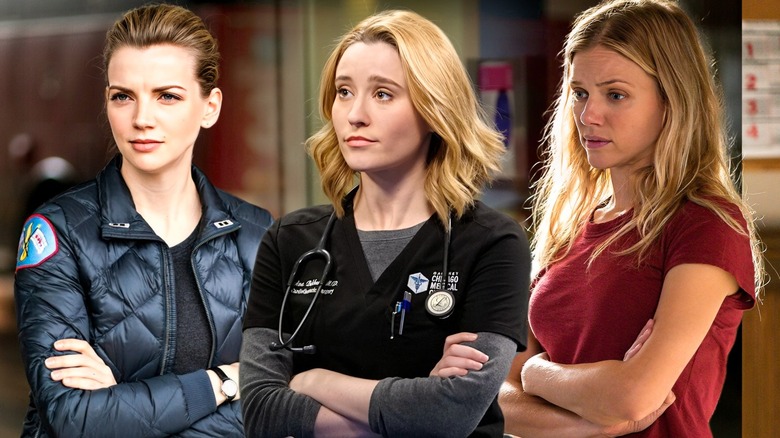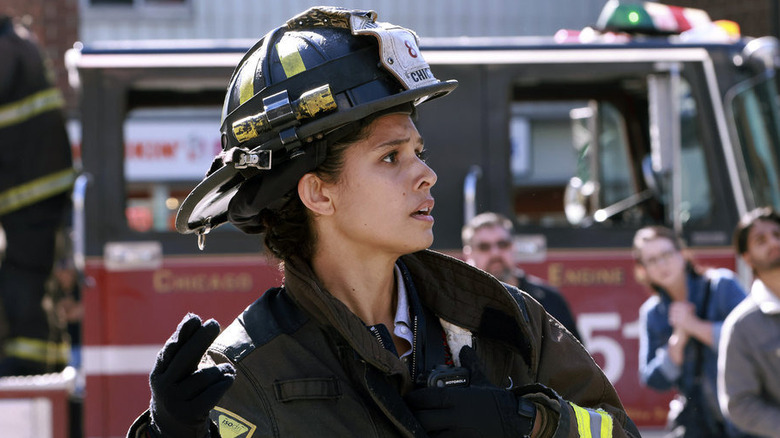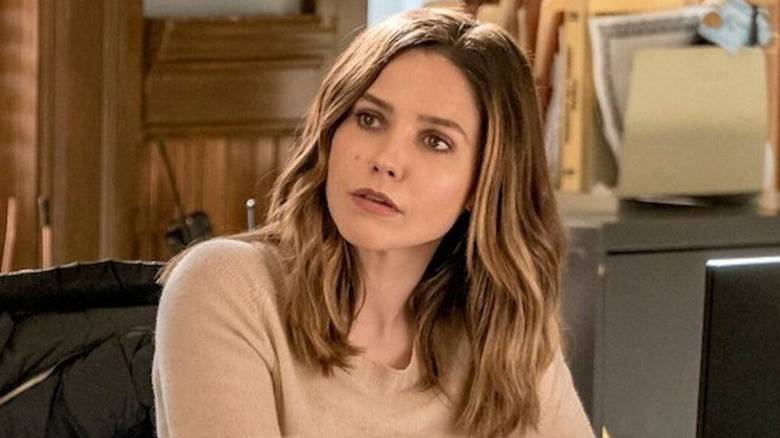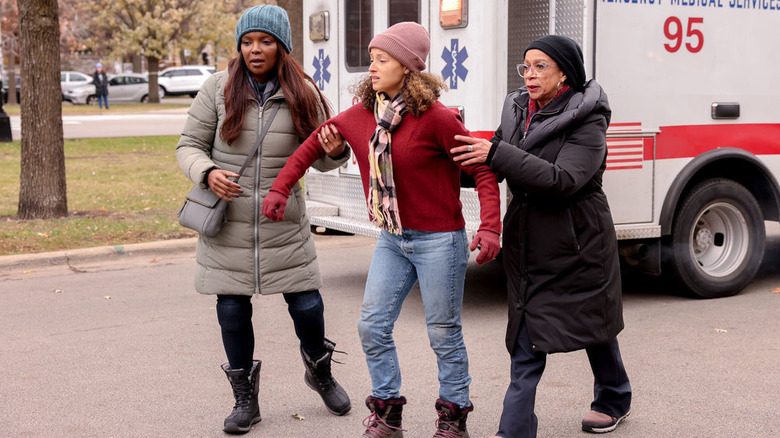Every One Chicago Show Has The Exact Same Problem

This article contains mentions of suicide.
The One Chicago franchise does a whole lot of things right. From show to show, this shared universe excels at balancing action and personal drama elegantly, in a way that keeps audiences coming back — with sympathetic backstories for characters, stunning set pieces, and interpersonal relationships that span the entire franchise. Year after year, the various shows have woven characters together through blood relationships, marriages, and friendships. All this is to say, “One Chicago” is a big deal. There’s nothing else quite like it on the air, and while Fox and ABC have tried to replicate the way these shows work, they have not succeeded to the degree that NBC has.
However, “Chicago Fire,” “Chicago Med” and “Chicago P.D.” all have one terrible problem in common — and it’s an issue which has plagued the franchise since early on. Point-blank, the way the “Chicago” shows treat female characters is appalling.
This poor writing for women is such an endemic issue across the board that it effects every single show. While shows like “9-1-1” feed their fans both top-flight action and well-rounded female characters (who grow and change and survive without grating on the audience), the women of “One Chicago” often find their fans torn away from them due to the storylines they’re forced into. Worse, these bad storylines often pop up right when these characters become central to the narrative — which means these former favorites become loathed right as they’re getting the most screentime.
Female character devolution is a problem on Chicago Fire

It would be nice to praise the women who dwell within the “One Chicago” universe instead of lamenting the way that they’re treated, but the three programs have a heavy reliance on a terrible formula — (1) introducing terrific female characters, (2) getting the audience love them, and (3) ruining them through terrible storytelling choices — which makes it impossible to do so.
Gabriella Dawson (Monica Raymund), Stella Kidd (Miranda Rae Mayo) and Sylvie Brett (Kara Killmer) all started out on “Chicago Fire” as smart independent women with differing backgrounds and levels of experience who won the audience’s trust and hearts. Sadly, as each of them suffered from character devolution over time, their storylines flattened out. Gabby’s wishy-washy behavior with Matt Casey (Jesse Spencer) — seriously – if getting pregnant is apt to kill you, perhaps you should tell the potential father of your child so? — and her almost superhuman faultlessness in the field eventually makes her hard to love, to the point where some fans celebrated when she stopped being a regular in Season 7. Just like Gabby, when Stella turns into the center of the show after Gabby’s departure, Stella also becomes a worse, pushier and less thoughtful character. Her relationship with the soon-to-depart Kelly Severide (Taylor Kinney) has devolved due to a lack of communication on her part and his willingness to accept that devolution. Then there’s Sylvie, whose pairing with best friend Matt has long been hoped for by fans of the show, but was forced to a near-instant hiatus with Spencer’s departure. Their on-again, off-again relationship makes her look indecisive.
All this leaves one hopeful that the wonderful Violet Mikami (Hanako Greensmith) will avoid the same curse as her co-workers.
Chicago Med and Chicago P.D. do not escape the curse of poorly-written female characters

The other two “One Chicago” dramas definitely don’t escape this problem … though in both cases, the discontinuity within their female characters often results in violent and depressing deaths for the characters involved. For example, on “Chicago P.D.,” Erin Lindsay (Sophia Bush) started out as an informant working under Hank Voight (Jason Beghe) who won the adoration of fans by making it onto the force herself. Her experience as an addict helped aid her on cases, and most of the show’s viewers were behind the slow-burning story of her recovery. Suddenly, her final season on the show leads Erin down a path of rage and frustration — which is true to the character, but overplayed to the point of being frustrating to watch. Her fury against a suspect leads to her removal from the squad. From there, Erin is shuffled off to New York at Voight’s behest, an incredibly unsatisfying ending for her character.
Meanwhile, on “Chicago Med,” Dr. Ava Bekker’s (Norma Kuhling) death is not only an insult to her character and the audience, but also a poor attempt at maintaining storyline suspense for cheap ratings. Ava abruptly went from a lovestruck doctor doing what’s best from her patients to an obsessed stalker willing to kill the father of the man she loved in the hope of getting his attention. The awful tale ends with Ava killing herself, an ending that’s cruel, undeserved, and causes the audience to dislike the character and arguably the show itself.
If you or anyone you know is having suicidal thoughts, please call the National Suicide Prevention Lifeline at 1-800-273-TALK (8255).
The best cure for One Chicago? Let your female characters be flawed and human, but still strong and worth rooting for

What’s the cure for the “One Chicago” universe’s treatment of female characters? Is it possible for all these shows to allow their female characters to evolve into fully-flawed people who can still be likeable, even while they’re complex? Well, yes, obviously — look to “Yellowjackets,” for instance, for a fantastic lesson on how a TV show can write flawed but fascinating women — but put simply, all the “Chicago” shows have to do is give these characters space to be human, while not bending them into whatever pretzel the current storyline is asking them for. Characters should dictate their storylines, not the other way around. If there’s no dire reason for someone to abandon their friends and families, then they shouldn’t.
Putting female characters in positions of power also shouldn’t result in sudden, rapid personality changes. This has happened to Gabby Dawson, Stella Kidd, and Erin Lindsay — and every single time, instead of these shifts making the character in question look authoritative, it just makes them unlikable. Fans don’t enjoy it when unlikable newbies like Dr. Dean Archer (Steven Webber) become even more officious when they gain positions of authority, and they like it even less when it’s someone who was previously beloved to them.
Departing actors and changing writing regimes will indeed shift situations, but keeping a strong throughline for your main characters will successfully connect your viewers to these major players no matter what happens — and nothing’s worse than making your audience hate characters that they’re supposed to adore.



